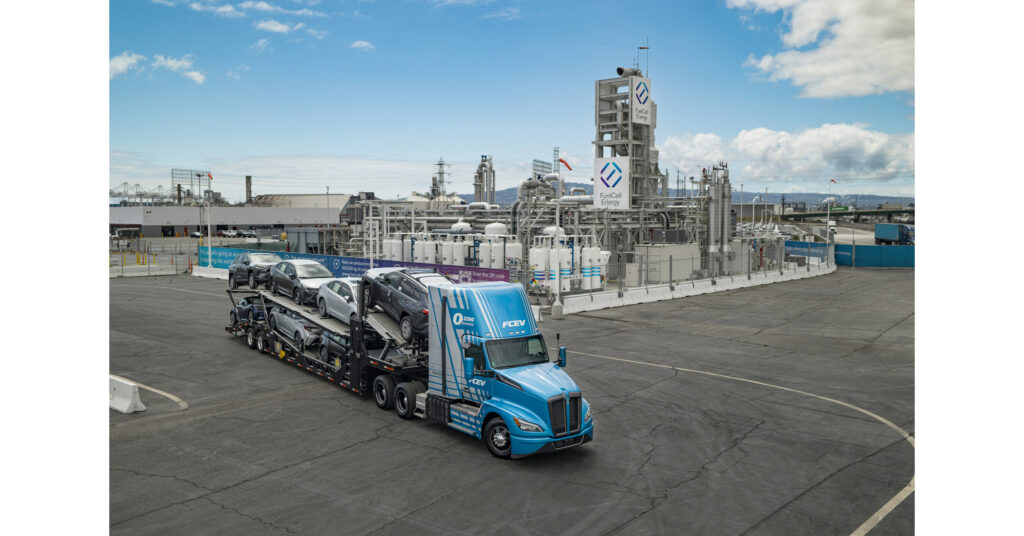FuelCell Energy has officially announced a partnership with Toyota Motor North America to set-up a first-of-its-kind “Tri-gen” system at the Port of Long Beach, California. According to certain reports, the stated Tri-gen system will have …
FuelCell Energy has officially announced a partnership with Toyota Motor North America to set-up a first-of-its-kind “Tri-gen” system at the Port of Long Beach, California. According to certain reports, the stated Tri-gen system will have the means to produce renewable electricity, renewable hydrogen, as well as usable water. Keeping that mind, it should be able to support the vehicle processing and distribution center for Toyota Logistics Services (TLS) at Long Beach, company’s largest North American vehicle processing facility that receives approximately 200,000 new Toyota and Lexus vehicles on an annual basis. More on the technology in play would reveal how it can produce 2.3-megawatts of renewable electricity, part of which will be utilized by the facility in question to support its operations at the port. As for the remaining electricity, it will be rerouted, under the California Bioenergy Market Adjustment Tariff (BioMAT) program, to a local utility in Southern California Edison. Moving on, the Tri-gen system can also produce up to 1,200 kg/day of hydrogen for the fueling needs of Toyota’s incoming light-duty fuel cell electric vehicle (FCEV). This it can do while simultaneously supplying hydrogen to the adjacent heavy-duty hydrogen refueling station, and therefore, support TLS logistics and drayage operations at the port.
“Tri-gen demonstrates that hydrogen-based energy can benefit businesses, deliver zero-emission transportation for light- and heavy-duty vehicles, support improved air quality in local communities, reduce water usage, and deliver immediate and long-term benefits to the environment,” said Jason Few, CEO and President at FuelCell Energy. “As a company, we are living our purpose when we enable visionary customers like Toyota to decarbonize their operations and harness the energy solutions offered by hydrogen—all while leaving communities with cleaner air and easing the strain on power grids and water supplies.”
The whole development delivers a rather interesting follow up to the introduction of California’s Advanced Clean Fleet Regulation, which allows only zero-emission trucks to register as drayage trucks. Not just that, it also looks upto a mandate which, by 2035, calls for all drayage trucks to be zero-emission. In response to these climate-oriented goals, the Tri-gen system has already unlocked support for FCEV Class 8 trucks. To build upon that support, though, it will continue to make advancements and facilitate this migration of ours to zero emission trucks between now and 2035.
Coming back to the effort in question, TLS Long Beach happens to the Toyota’s first port vehicle processing facility powered by 100 percent on-site generated renewable electricity. This was achieved, by and large, on the back of FuelCell Energy’s innovative fuel cell technology which uses an electrochemical process to convert directed renewable biogas into electricity, hydrogen, and usable water. Another detail worth a mention about this technology talks to how it banks upon a highly efficient, combustion-free process that emits virtually no air pollutants.
All in all, TLS operations at the Port of Long Beach, Tri-gen are currently projected to reduce more than 9,000 tons of CO₂ emissions from the power grid each year. Furthermore, it will help us stifle more than six tons of grid NOx emissions, which are harmful to both people and the environment. Hold on, there is more, as applying hydrogen-powered fuel cell Class 8 trucks in port operations can also reduce diesel consumption by more than 420,000 gallons per year.
“FuelCell Energy and Toyota’s collaborative effort signifies technological innovation and also positions Long Beach at the forefront of global leadership in renewable energy solutions,” said Rex Richardson, Mayor of Long Beach. “This transformative initiative solidifies our city’s status as a trailblazer in green initiatives.”




